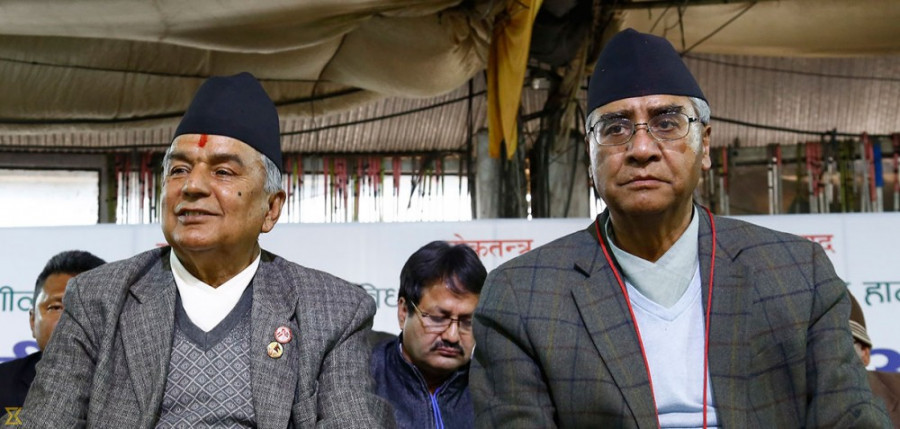Politics
Deuba, Poudel struggle to forge common stance on House dissolution
The party needs to send a message of unity to its cadres and maintain a balance in its relationship with both factions of the communist party, they say.
Anil Giri
On Monday evening, Nepali Congress President Sher Bahadur Deuba visited senior party leader Ram Chandra Poudel and spent an hour with him over a couple of coffees. This was probably the first time in over a year that Deuba visited Poudel’s residence at Bohoratar.
The meeting comes as the two leaders are at odds over how the party should respond to Prime Minister KP Sharma Oli’s decision to dissolve the House of Representatives and declare snap elections.
Deuba, as soon as Oli dissolved the House, termed the move “unconstitutional and undemocratic” but has been maintaining that the Nepali Congress should contest elections if the Supreme Court gives its nod to the dissolution of the House of Representatives.
However, Poudel doesn’t agree with Deuba and has been insisting that the Nepali Congress oppose the dissolution of the House as well as launch stern protests demanding its restoration.
Poudel confirmed to the Post that he met Deuba. “The country is reeling under a crisis of confidence among major parties,” Poudel told the Post. “Oli’s action has eroded confidence and mutual trust among the parties. So we discussed how to move ahead and how to organise the general convention of the party—an issue that has been overshadowed by the dissolution of the House,” Poudel added.
Some of Deuba’s allies had been advising him to reach out to Poudel to send a message of unity to the grassroots, a leader close to Poudel told the Post.
But Deuba is counting down the days until the formal split of the Nepal Communist Party, a Deuba ally said. Once the NCP splits and becomes the two parties, then it would be easier for the party leadership to make a call. “That is why we are not taking a firm position now,” the leader added.
Political observers and commentators also observe that the Nepali Congress has failed to send a message of unity to its cadre on the latest political situation in the country.
“We have been telling both leaders not to air opposing views regarding Oli’s move and urged them not to create confusion among the party carders, the public at large,” a youth leader said, as we kept on pressurizing both, finally they met.
Some Nepali Congress leaders suspect that both Oli and his rival Pushpa Kamal Dahal are trying to woo the two camps to toe their line. But Nepali Congress leaders don’t publicly admit that the party’s leadership is at odds due to the influence the rival camps of the Nepal Communist Party hold in the Nepali Congress.
“We read in the news that Deuba, Dahal and Oli have been playing their cards,” said senior Nepali Congress leader Ram Sharan Mahat. “There are also questions over provincial governments. So naturally, both sides are looking at the Nepali Congress for support.”
Mahat added that the top leaders of the Nepali Congress may be at odds with each other, but as a democratic party that played a pivotal role in promulgating the constitution, it should speak up. “If the Supreme Court passes a verdict in favour of elections, it would be the mistake on the part of the court—not ours. So we will contest the elections,” he told the Post.
“Yes, the party will get a favourable environment if elections do take place. But it is also equally important for us to bring the constitution back on the right track,” said Mahat.
Analysts say that they still don’t see the Nepali Congress come up as a united force—regardless its stance over Oli’s move to dissolve the House of Representatives. Deuba, who has been at the centre of Nepali politics for decades, knows how to make the most of an opportunity to come to power, they say.
“It seems Deuba is looking for an opportunity. He is doing his calculations,” said analyst Puranjan Acharya, who follows the Nepali Congress. “He wants to get to power. There is also pressure on him to organise protests, but he should realise that an agitation on the streets would not hamper the NC’s prospects in the elections,” said Achaya.
Party leaders from both factions said that the upcoming Central Working Committee meeting, scheduled to begin next Wednesday, will come up with a more concrete plan, especially with regard to the provincial governments.
The party is under pressure to pick sides in the provincial government as both Oli and Nepal factions are looking for support from the Nepali Congress, particularly in Province 1 and Bagmati.
Though Nepali Congress does not have a party committee in the provinces, any decision regarding provincial governments should be taken at the centre. “This has become a test for our party leadership too,” a central committee member said.
Nepali Congress now stands at a qcrossroads following the promulgation of the new constitution, political analyst Geja Sharma Wagle told the Post. “So the Nepali Congress should take a decision in favour of democracy and the constitution.”
Wagle added that the Nepali Congress should not make a call eying short-term gains. “ At present, the party is weighing its options. It should maintain a delicate balance in its relations with both communist the factions,” said Wagle.




 13.12°C Kathmandu
13.12°C Kathmandu














